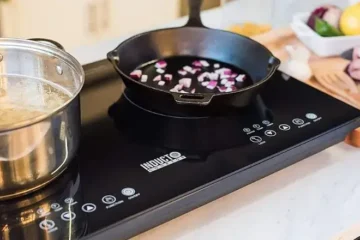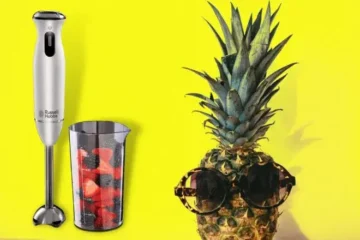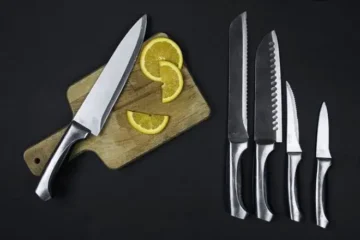With the growing awareness of the health advantages of juicing, you may be ready to invest in a juicer. Juicers are classified into two types: Centrifugal vs Masticating Juicer.
Their names are derived from their mode of action. Simply described, centrifugal juicer shreds or grates fruits and vegetables inside a rotating chamber. The juice is separated from the pulp using centrifugal force. A masticating juicer, on the other hand, does exactly what it sounds like: it “chews” or smashes the fruits and vegetables as you push the cut-up pieces down a tube. The pulp is pushed out via one location while the juice is poured out through another.
Table of Contents
- 1 Types of Juicers – Centrifugal vs Masticating Juicer
- 2 What is Centrifugal Juicer?
- 3 What is Masticating Juicer?
- 4 Which Juicer is Better Centrifugal or Masticating?
- 5 Convenience Of Using Juicer – Centrifugal vs Masticating Juicer vs Triturating Juicers
- 6 Conclusion – Centrifugal vs Masticating Juicer
Types of Juicers – Centrifugal vs Masticating Juicer
Centrifugal juicers are often the least-priced choice. While they can manage most fruits and vegetables, they do not do as well with greens. If you want to reap the nutritional advantages of spinach, kale, or other dark greens, you should avoid using a centrifugal model.
The masticating juicer does a better job of extracting the juice. Because so much juice has been taken, the pulp that is pushed out may be drier than you think.
That’s something to keep in mind if you’re concerned about the masticating juicer’s higher price tag. While it is more expensive than a smaller centrifugal device, it extracts juice more efficiently.
There is also some agreement that the juice extracted will have a longer shelf life because it was produced at a slower pace and with less heat. The common consensus is that the higher speeds of centrifugal juicers promote greater foaming and oxidation in the juice produced, which can harm the enzymes and nutrients. As a result, the juice may have a little lower nutritional value and a shorter shelf life.
Let’s take a closer look at the Pros and Cons of each type of juicer.
What is Centrifugal Juicer?
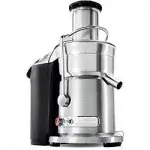
Pros
- Masticating juicers take longer to juice than Centrifugal juicers.
- It is simple to clean. Dishwasher safe in most cases.
- Large fruit chunks are readily handled.
- The vertical shape is more compact and takes up less counter space.
- Centrifugal juicers are less expensive.
- Ideal for busy/large families, events/parties – quicker juicing and less meal prep time.
Cons
- Not great with leafy greens or wheatgrass.
- Masticating juicers extract more juice.
- Nutritional value is reduced. High speed has an impact on the quality of the juice.
- There might be more froth in the juice.
- Increased noise level. The high-speed motor generates additional noise.
- Juice has a shorter lifetime. Juice from centrifugal machines must be consumed right away.
What is Masticating Juicer?
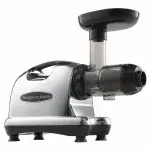
Pros
- Better than centrifugal juicers for extracting juice. Increased juice yield.
- Excellent for juicing lush green veggies.
- Slower mastication results in more nutritional value.
- It can be used to mince herbs, grind coffee, prepare baby food, and so on.
- There is less froth in the juice.
- It is less loud since the grinding motors are sluggish, resulting in a very low noise level.
- Increased shelf life. Because there will be no oxidation, the juice can be kept for longer than 72 hours.
Cons
- Slow. Juicing time is longer than with centrifugal juicers.
- It is more expensive. Prices for centrifugal juicers might be significantly higher.
- More work is required. Before sending fruit and vegetables through the juicer, they must be cut into smaller bits.
- Bulkier. Their more capacious lie-flat form takes up more counter space.
Which Juicer is Better Centrifugal or Masticating?
It’s straightforward. Consider the benefits and disadvantages of each juicer type before making a selection. It will make things much easy for you.
Will you mostly juice leafy veggies and grass? Is it important that you juice greens every time you use a juicer? Is the nutritional content of veggies important to you?
If you answered yes to all three questions, go with a masticating juicer.
Are you mostly juicing watery fruits and just sometimes juicing vegetables? Do you prefer to get your juice quickly and without having to wait too long?
If you answered yes, go with a centrifugal juicer.
Buy both types of juicers if you can afford them. Purchase both a centrifugal and a masticating juicer. One has apparent advantages and disadvantages, and they can complement each other quite effectively. If you’re making fruit juice for a large gathering or party, for example, utilize a centrifugal juicer. If you’re doing a strict vegetable-only juice and have more time on your hands, drag out the masticating juicer.
However, if you can only afford ONE juicer, consider the benefits and drawbacks listed above and base your selection on that.
Read Also: Best Kitchen Knife Set in India | Precision in Every Cut
Convenience Of Using Juicer – Centrifugal vs Masticating Juicer vs Triturating Juicers
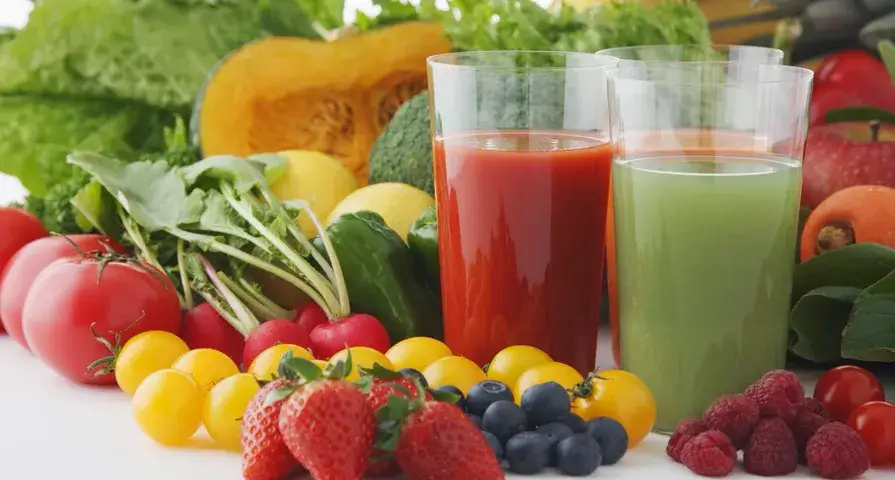
Centrifugal vs Masticating Juicer vs Triturating Juicers are the three main types of electrical juicers that can be purchased at various stores around the world.
Owning and using any of these different types of juicers in your home is a very convenient way to obtain the maximum amount of nutrients from all sorts of raw vegetables and fruits as well as wheatgrass.
By taking a few minutes to use your electrical juicer to produce fresh juice in your own home, you can save yourself some money, especially if you grow some of the foods on your property, even if it means just having a few plants in a window garden.
It may not seem like you are saving money when you have to spend a hundred or more dollars to purchase your juicer, but once the juicer is purchased you will be saving money on the price of fruit and vegetable juices that you would have been buying at the store.
You will not be paying for the processing, packaging, storage, and display of containers of fruit or vegetable juice that are inferior to the juices that you are capable of producing with your juicer.
Whether the product is acquired from your garden or a store, you can still save money by making all sorts of nutritious drinks in the comfort of your kitchen.
Conclusion – Centrifugal vs Masticating Juicer
Using and cleaning a juicer does not take much time from your day. In just a few minutes, you can supplement your diet and the diet of your family members with a glass of homemade juice. Some people claim that certain vegetable juices have curative properties for physical ailments.
Whether or not that is true, the juices that you make are more nutrient-rich than those that can be purchased at a store. Drinking a glass of homemade juice will give your body a boost of vitamins, minerals, and other essential nutrients that it might not get from your regular diet.
Just having those vitamins daily will help you feel better and healthier. Most of the juicers that are sold today are quite easy to clean so there is no worry of having a huge mess to deal with when the juicing session is completed.
Another way that using a juicer is convenient is the fact that you can make the juice whenever you want to have a very healthy drink. As time goes by, the juice that you make will slowly lose some of the nutrients through oxidation which occurs when the juice is exposed to the air.
Although some homemade vegetable juices can be stored in the refrigerator for a limited amount of time, it is best if they are consumed immediately after being made. If it is necessary to store the homemade vegetable juice, the container needs to be filled to the brim and tightly sealed so that there is no access to air that would leach out the nutrients and the juice should be consumed within a few hours of processing.


